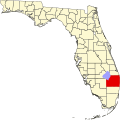2000 census
As of the census of 2000, there were 2,005 people, 1,024 households, and 677 families residing in the city. The population density was 565.1 people/km2 (1,464 people/mi2). There were 1,140 housing units at an average density of 321.3 units/km2 (832 units/mi2). The racial makeup of the city was 97.11% White (94.6% were Non-Hispanic), [10] 0.50% African American, 2.00% Asian, 0.20% from other races, and 0.20% from two or more races. Hispanic or Latino of any race were 2.59% of the population.
As of 2000, there were 1,024 households out of which 8.8% had children under the age of 18 living with them, 61.8% were married couples living together, 3.7% had a female householder with no husband present, and 33.8% were non-families. 29.7% of all households were made up of individuals and 23.0% had someone living alone who was 65 years of age or older. The average household size was 1.96 and the average family size was 2.36.
In 2000, in the city the population was spread out with 8.6% under the age of 18, 2.4% from 18 to 24, 10.8% from 25 to 44, 27.0% from 45 to 64, and 51.2% who were 65 years of age or older. The median age was 66 years. For every 100 females there were 86.7 males. For every 100 females age 18 and over, there were 86.1 males.
In 2000, the median income for a household in the city was $71,019, and the median income for a family was $82,807. Males had a median income of $38,906 versus $47,188 for females. The per capita income for the city was $47,614. About 4.8% of families and 4.0% of the population were below the poverty line, including none of those under age 18 and 3.8% of those age 65 or over.
As of 2000, speakers of English as a first language accounted for 97.94% of all residents, while Spanish was the mother tongue of 2.05% of the population. [11]
As of 2000, Atlantis had the 126th highest percentage of Cuban residents in the US, with 1.70% of the populace. [12] It had the sixteenth highest percentage of Syrian residents in the US, at 1.20% of the city's population, [13] and the tenth highest percentage of Australian residents in the US, at 1.10% of its population (tied with Mad River, Ohio, Lebanon, Maine and Gilmer, Illinois). [14]


